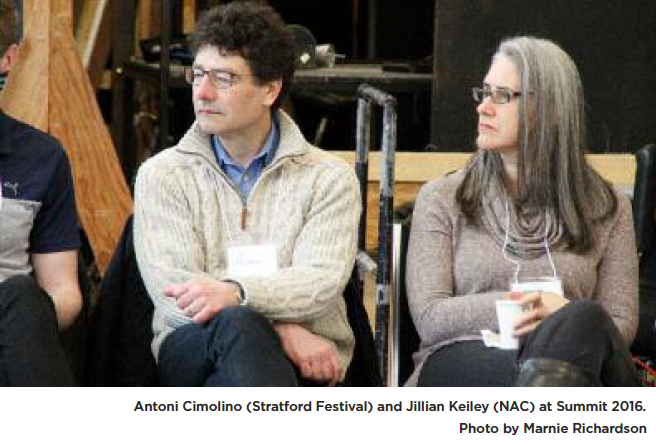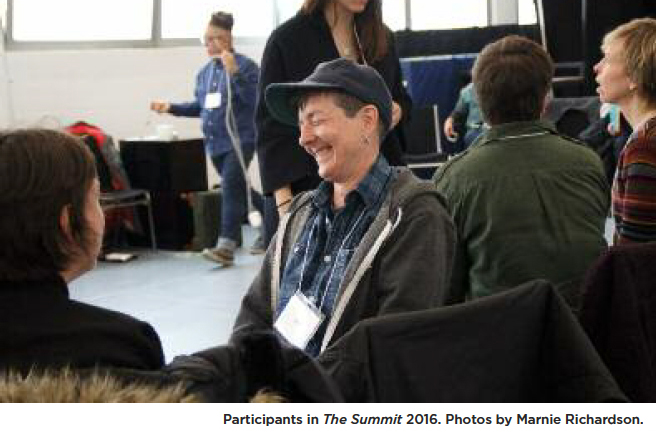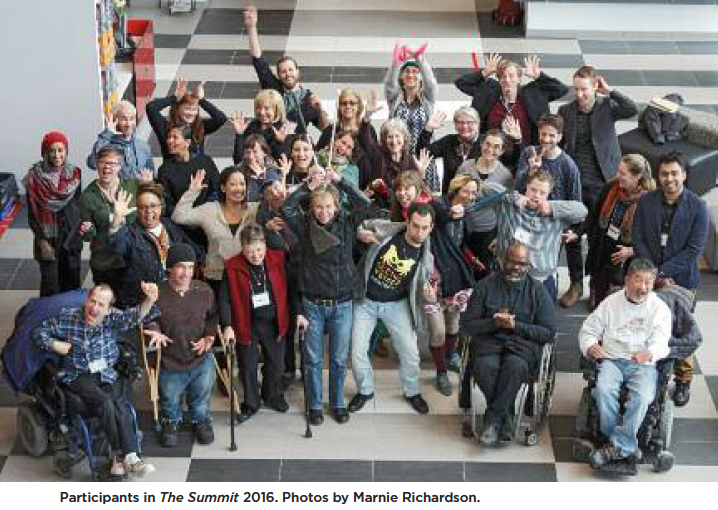Forum
Changing the Shape of Things:
A Reflection on Power, Privilege, and the Benefits of Institutional Transformation
1 I have spent my life in privilege. I am white. I come from a very comfortable middle-class family. I was born in Canada. I was given access to the best schools and have had a life filled with wonderful work opportunities. I came out as queer in my twenties, was Artistic Director of Buddies in Bad Times Theatre in my thirties, and in my forties I brought it all to a head with both the creation of The Failure Show: A 13-point manifesto for the consideration of failure, and the completion of an MA in Cultural Studies from Queen’s University.1 Now in my fifties I find myself at Canada’s National Arts Centre (NAC), working in English Theatre with Jillian Keiley and the rest of the team. Of all the things that have changed since I was born, my privilege has remained the same but my sense of it has changed completely.
2 I only recently encountered the idea of TABs (temporarily able bodied people). I only recently understood that I too am a TAB. This realization did not come about from an accident or some unimagined or unexpected trauma. Rather, it arose through a series of gifts: friends, education, work, and love. In broad terms (pun alert), my awakening began with my mother, Anne Raynsford Stanley, and has continued through my friends Alex Bulmer, Jan Derbyshire, and Judith Snow. My understanding of the world and my place within it has never felt secure. In recent years, and with the help of many, I have begun to put this insecurity to work. I have begun to acknowledge the interdependence of all things, and to note how much better the work, and the world, is when this interdependence is recognized. While I fail every single day to do this adequately, this inability to surrender to the collectivity of action and life is a terrifically motivating gift. I want to be able to do this. I see the benefits. I see how much I have to learn, every day, from the Deaf, disabled, and mad artists with whom I have the privilege to work.
3 In 1994 I worked with my great friend Alex Bulmer on a site sympathetic production of Oedipus under the Gardiner Expressway in Toronto.2 Alex was at the mid to late stage of her eyesight loss and our collaboration opened our continuing conversation about disability and theatre. In 2008 I was approached by my now constant collaborator, Michael Rubenfeld, to collaborate with him, Judith Snow, and Caleb Young on the next installment of an incredible show that they and Tara Beagan had created for The Rhubarb Festival in Toronto called Suck and Blow.3 This led us to create Book of Judith and Selfconscious Theatre and these have had profound impacts on my life. Both shows drew from life-changing encounters with Snow and her politics of inclusion. As a queer creator and director, I have been drawn to the idea of society’s other throughout my career. That said, I did not develop a focused interest in the art and practice of artists with different abilities until I met and worked with Judith Snow. Her international leadership and insights about inclusion gave me access to a whole world of creative thought and action that I have been engaged with ever since. In 2014, Selfconscious Theatre presented what became our final showing of Book of Judith at The Abilities Centre in Whitby, Ontario. As part of the show we also produced an artistic knowledge exchange event called Accessing the Arts Symposium. Judith performed in the show and presented at the conference. Very sadly for so many of us, she passed away in May of 2015.
4 In 2014, English Theatre at the NAC embarked on our first Cycle: a two-year process delving into the depth and breadth of Indigenous work in Canada. Following the first Cycle, the NAC announced that it would launch an Indigenous Theatre Department in 2019. Building on the strength of that work, the NAC has now launched The Second Cycle, a four-part plan to engage with the depth and breadth of disability performance work in Canada. The Second Cycle is composed of The Summit, The Study, and a culminating public event called The Republic of Inclusion. It is happening over a two-year period and aims to gather insights, information, and tools for generative change. We began with a one-day event entitled The Republic of Inclusion. Co-curated by Alex Bulmer and me at The Theatre Centre on February 15, 2015, it was part of Toronto’s inaugural PROGRESS FESTIVAL and was produced by The Collaborations, a program I curate as part of NAC English Theatre. This one-day event was, in many ways, a temperature taking, a “culture build” moment. UK-based international disability arts performer Jess Thom delivered a galvanizing keynote address about relaxed performances. With attendees from Ontario and across the country, the event brought together several groups who had previously been out of touch. It was a terrific building block day that gathered several of the key players who would go on to participate at our second Cycle action, Summit 2016.
5 Summit 2016 was the launching pad for a more practice-based investigation planned for June 2017 in Ottawa. It was produced by the National Arts Centre English Theatre in partnership with the Stratford Festival from April 10-12, 2016. For two and half days, thirteen Artist/Leaders and twelve institutional Respondents gathered at the Stratford Festival to steep themselves in discussions of theatrical work by and about artists from the Deaf, disability, and mad arts communities. The outnumbering of Artist/Leaders to institutional Respondents was a key element in the success of the conversation. Summit 2016 was an opportunity to listen and learn. For English Theatre at the NAC, it was also a chance to build relationships and explore ways to work collaboratively towards inclusive practice with other engaged players including The Stratford Festival, The Luminato Festival, Playwrights Workshop Montreal, Playwrights Theatre Centre (Vancouver), the University of British Columbia Department of Theatre and Film, the Canada Council for the Arts, the Arts Council of England, and the British Council. We sought to strengthen the network of performance organizations by inviting interested parties into a larger discussion about theatrical work by and about artists working within the Deaf, disability, and mad performing arts milieu.
6 “Changing the shape of Canadian Theatre and impacting the processes used for its creation” was the operating statement for Summit 2016, and its impulses grew from a desire to examine how power shapes our every interaction. In the late spring of 2015, I approached Syrus Marcus Ware about co-curating The Second Cycle with me. Ware is a powerful artist and academic standing at the intersection of many identities and professional placements. His capacity to work across difference and to engage deeply with process made him an exciting person for the task. Our operating statement prompted us to begin by asking good questions, and we had many! How, for example, can an inclusive and accessible model transform our thinking about theatre in general, and practice in particular? How can mainstream and institutional theatres think differently about programming, developing, and investing in disability arts work? When considering Deaf, disability, and mad art, what are the hidden obstacles to beginning a conversation, and following on from this, devising a new practice in earnest? What can institutions do, those that are in possession of resources, to begin to respond to actual needs and wants rather than dictating what is to be “on offer”? How, in other words, can institutions learn to respond effectively? What is the role of an engaged respondent? How might an engaged respondent listen better than a—by way of example—corporate problem solver or fixer? How best to dislodge beliefs that are no longer helpful for moving community forward? What are the ways that we can all work creatively to reframe the conversation of Deaf, disability, and mad art practice into a commonly held space by all creatively engaged makers?
 Display large image of Figure 3
Display large image of Figure 37 Our circle-style meeting structure brought together Artist/Leaders and institutional Respondents in (almost) equal measure. The thirteen Artists/Leaders led the conversation and the twelve Respondents (representing the various institutions) followed along. The Respondents were not expected to be entirely passive; rather, we explored formal conventions with an aim to better activate institutions in these discussions. Artists coming from across Canada, the UK, and the US were: Jan Derbyshire, Eliza Chandler, Michelle Decottignies, Christine Karzca, Niall McNeill, Jack Volpe, Debbie Patterson, Alex Bulmer, Rose Jacobson, Melanie G. Campbell, Paul Power, Baraka de Soleil, and Kazumi Tsuruoka. The Respondents were composed of institutional leaders from NAC English Theatre, The Stratford Festival, Toronto’s Luminato Festival, Playwrights Workshop Montreal, The Playwrights Theatre Centre (Vancouver), the University of British Columbia Dept. of Theatre and Film, The British Council, The Canada Council for the Arts, and the Arts Council of England.
8 One of the key markers of The Second Cycle is that it has the capacity to gather people in ways that are unusual, focused, and extremely productive. Countless comments from Summit 2016 were about the fact and power of the gathering. Participants highlighted how drawing together artists/leaders of this stature and experience to talk about their practice was both new and valuable, particularly in contrast to more common instances of being called upon simply to represent a position, often in a token way, and inform institutions. While knowledge exchange remains an exciting part of this structure, there is palpable excitement about the scope and scale of work that already exists. This work provides tremendous motivation for the future. The Compendium, a compilation of existing works, practice and artists started at Summit 2016 will ultimately be available on The Second Cycle website at the NAC, along with a report, video interviews, pictures, and other related writings. Most importantly, however, we hope that our work can add to the decades of prior work and be of service towards furthering the conversation about Deaf, disability, and mad art theatre practice in Canada.
9 This short essay is called “Changing the Shape of Things.” The first thing to change shape has been my understanding of my privilege. I now recognize that I can use it for good. Because of my position at the NAC, I can, for example, use my privilege to interrogate ableism in contemporary professional theatre practice and culture. Further, through the gentle yet extremely firm teachings of artists and leaders from the Deaf, disability, and mad arts milieu, I can gain by personally re-framing what I consider to be best practice in any of my current theatrical processes. The Second Cycle is an invitation to consider what is no longer useful in our creation practices, to learn all that might better our collective work, and to educate ourselves as to the countless successes and stories that already exist in the Canadian Deaf, disability, and mad performing arts communities. Collaboration works in two directions. When power is uneven this simple truth is all too often forgotten. The Second Cycle is structured to remind us all of this. It also aims, through knowledge exchange and mobilization, to remind us that inclusive practice is good for everybody.

